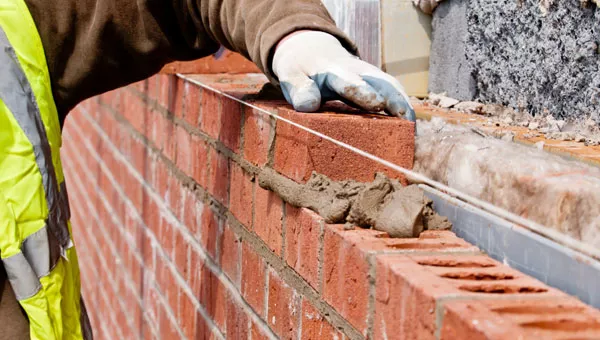Opening the Secrets of Sustainable Stonework Construction Practices for Eco-Friendly Structures
Among the myriad techniques to eco-friendly building, lasting stonework construction stands out as a reliable and long lasting method that holds a wide range of untapped potential. From the option of products to ingenious building strategies, the keys to attaining sustainability within masonry construction are multifaceted and appealing.
Benefits of Lasting Masonry Building And Construction
Accepting sustainable stonework construction techniques not just decreases ecological effect but additionally provides lasting economic advantages to builders and areas. By utilizing products like recycled bricks, obstructs, and rocks, home builders can substantially decrease the carbon impact of their projects while advertising resource performance. Additionally, lasting stonework building techniques, such as proper insulation and thermal mass residential properties, can improve energy efficiency within structures, resulting in lowered functional costs over time.
In addition, the sturdiness and resilience of stonework frameworks contribute to long-lasting economic advantages. Buildings constructed utilizing lasting stonework methods often call for much less repair and maintenance, converting to set you back savings for contractors and homeowner. The longevity of stonework materials also guarantees that structures remain stable and secure, reducing the need for frequent remodellings or replacements.
Eco-Friendly Masonry Materials
Using eco-friendly masonry products is a pivotal action in the direction of enhancing the sustainability of building practices and decreasing environmental impact while making the most of lasting economic advantages. Lasting stonework products are sourced, produced, and used in a fashion that lowers overall ecological impact. Products such as recycled blocks, reclaimed stone, and lasting concrete blocks are coming to be significantly popular choices for eco-conscious home builders. Recycled blocks, as an example, not just draw away waste from land fills however likewise need less energy to produce compared to brand-new bricks. Recovered stone supplies an unique visual allure while lowering the requirement for new quarrying. Lasting concrete obstructs integrate recycled aggregates and might feature improved insulation buildings, adding to energy efficiency in structures.
Moreover, natural materials like adobe, rammed planet, and straw bales give exceptional thermal mass residential or commercial properties, lowering the need for home heating and cooling down energy. These products are commonly locally available, promoting local economic situations and minimizing transportation-related carbon emissions. By choosing environment-friendly masonry products, building jobs can dramatically reduce their ecological impact and add to the production of much healthier, a lot more sustainable developed environments.
Energy-Efficient Masonry Techniques
Energy efficiency plays an important function in enhancing the sustainability of masonry building methods. By carrying out energy-efficient masonry methods, building contractors can significantly reduce the overall energy usage of a structure, bring about reduced functional prices and a smaller environmental footprint. One key energy-efficient masonry technique is making use of thermal mass, which includes incorporating thick products like concrete or brick into the structure's framework to take in and store warmth. This helps control indoor temperature levels, reducing the demand for mechanical heating and cooling down systems.

Innovations in Sustainable Masonry
Current innovations in sustainable masonry methods have actually brought about ingenious methods that are improving the building and construction sector. One such innovation is the advancement of self-healing concrete, which makes use of bacteria installed within the concrete to heal cracks autonomously. This breakthrough not just reduces upkeep prices however likewise improves the longevity of stonework structures, contributing to their sustainability.
An additional noteworthy technology is toyota car dealership using recycled accumulations in stonework building - masonry contractor. By incorporating materials such as crushed ceramic waste or recycled glass into concrete mixes, building contractors can reduce the environmental influence of construction projects while keeping architectural honesty. This technique not only diverts waste from land fills however also saves natural deposits, making it a vital advancement in sustainable stonework building
In addition, the combination of digital layout devices, such as Building Information Modeling (BIM), is transforming the means stonework structures are prepared and created. BIM allows for even more specific estimations, minimized product waste, and enhanced power efficiency, eventually resulting in more lasting structure practices. These developments collectively represent an appealing future for sustainable masonry construction in the period of environment-friendly buildings.
Future Trends in Masonry Sustainability
With the innovative strides made in lasting stonework methods, the future fads in masonry sustainability are poised to more reinvent the building and construction sector. One of the key fads forming the future of masonry sustainability is the raised combination of technology. Improvements such as Building Information Modeling (BIM) and online fact simulations are being utilized to maximize masonry building processes, leading to minimized material waste and improved power efficiency in buildings.
Additionally, the development of novel sustainable products is readied to play a significant role in enhancing the eco-friendliness of masonry construction. masonry contractor. Innovations like self-healing concrete, recycled accumulations, and Continued bio-based binders are getting traction for their ability to reduce environmental effect while keeping structural integrity

Verdict
In conclusion, sustainable stonework building and construction methods use numerous benefits for environmentally friendly buildings. masonry contractor. Developments in sustainable her explanation stonework are continuously being established to additionally boost the ecological efficiency of buildings.